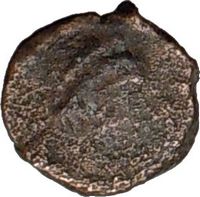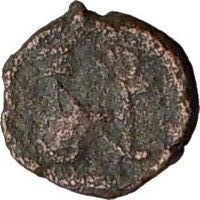Zeno Rare Byzantine "Roman-era"
Emperor 474-475 and 476-491 A.D. Biography & Authentic Ancient Coins for
Sale
Enjoy incredible value as every coin purchased
here comes with it's own, signed, custom-made certificate of
authenticity, a
$50-$100 value, absolutely free! Check it out today.
You can watch the video below for more info.
 
Example of Authentic Ancient
Coin of:
Zeno - Roman Emperor: 474-475 & 476-491 A.D. -
Bronze AE4 Antioch mint: 476-491 A.D.
Reference: RIC 973
DNZENO - Diademed, draped and cuirassed bust right.
Wreath; monogram
 within.
within.
Zeno
(Latin:
Flavius Zeno;
Greek:
Ζήνων; c. 425 9 April 491), originally named Tarasis,
was
Eastern Roman (Byzantine) Emperor from
474 to 475 and again from 476 to 491. Domestic revolts and religious
dissension plagued his reign, which nevertheless succeeded to some
extent in foreign issues. His reign saw the end of the
Western Roman Empire under
Julius Nepos and
Romulus Augustulus, but he contributed
much to stabilizing the eastern Empire.
In ecclesiastical history, Zeno is associated with the
Henotikon or "instrument of union",
promulgated by him and signed by all the Eastern bishops, with the
design of solving the
monophysite controversy.
Zeno was an Eastern emperor during the waning days of the empire. His
career was recorded through a series of endless plots against him which
failed to oust him from power entirely. Indeed, he even served as
emperor-in-exile during a revolt that briefly saw Basiliscus rise to the
throne in 475. He eventually recaptured the throne himself to resume a
rocky relationship with the Western half of the empire as well as
frequent domestic problems of every sort. Following the favorable
resolution of the Basiliscus affair he had ample time as well to watch
the final collapse of the Western half of the empire. As he had no
resources to contend with the germanic tribesmen who were exerting ever
more control over the former empire, he could do little more than accept
the inevitable outcome. Although this made him nominally ruler of the
entire Roman empire after the death of Julius Nepos in 480, in practice
he held no sway at all in any of the former Roman provinces. In the end,
one of his most remarkable feats was the very fact that he was able to
survive for so long in this strife-ridden age.
|